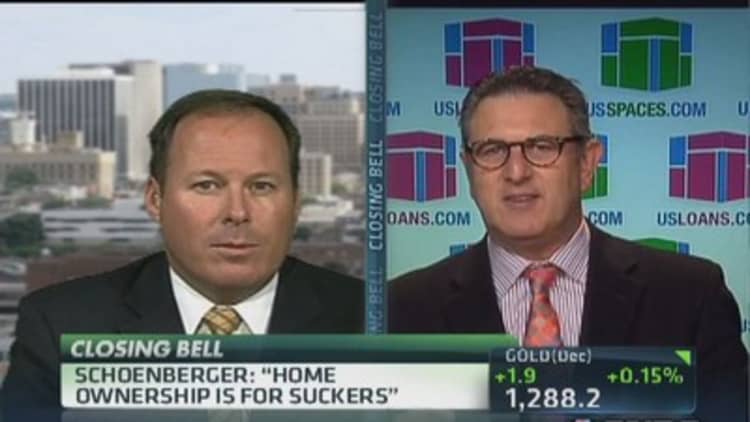Almost everyone once thought of their house as their largest and safest investment—until the bubble burst.
For generations, prudent "savers" would put sizable chunks of their incomes into their homes. To begin with, you would buy a house slightly above your price range, thinking, "My salary will increase about 2 percent to 3 percent each year, and soon it will be just right."
Ten years down the road, you redo your kitchen and expand your bathroom with the notion of adding value and growing your nest egg. Then, crash! Seemingly out of nowhere, your largest investment takes a major thrashing.
We all knew the stock market could turn south, although many of us didn't want to believe it. But your house? Never. So what now?
The U.S. government has increased its spending on and promotion of home ownership. Interest rates are lower than ever before, and home prices in some areas remain depressed. Buying a home appears very attractive. It may be, but it is time the investment misconception is thwarted.
(Read more: Buying your first home? Read this before signing)
The most attractive feature I seek in an investment is the potential future cash-flow stream. I ask, "Is this investment going to generate consistent and growing cash flows?" When I look at my home, the answer is no.
Awful cash flows
In fact, cash flows associated with home ownership are seemingly awful. You pay a negative stream of cash flows for 30 years—or a lump sum, if you pay all cash up front—and in return, end up with a very modestly liquid asset that has kept pace with inflation.
But over the course of those three decades, my home will not infuse any cash into my checking account. Not once.
(Obviously, this all relates to a primary dwelling; investments in rental properties are an entirely different concept all together and, done correctly, can offer a very attractive stream of cash flows.)
This doesn't mean home ownership is a poor choice; it's just not the ideal destination for your investment dollars. To start with, humans tend to be "hyperbolic discounters." In other words, procrastinators when it comes to saving. Too often we forgo saving for retirement to meet the expenses of today.
(Read more: There's more than one way to pick an advisor)
Home ownership effectively forces you to save by making payments. In the past, it also protected you from splurging. Homes are rather illiquid, so it used to be nearly impossible to cash in on one, as you could with a bank account, and buy that new Ferrari—but more on that in a moment.

Elucidating these concepts will highlight some of the follies of subscribing to these beliefs. Forced savings is not a bad idea; almost everyone ought to save more. But a home, as a savings vehicle, is quite unlike a traditional savings account.
Because the balance in my bank account doesn't fluctuate, I know I can recoup all of it. In addition, many savings accounts offer a rate of return that keeps pace with inflation. What's more, savings account balances are readily available, or liquid.
Conversely, if you needed funds immediately, it would be difficult to turn your house into cash overnight—and certainly for a fair price. In finance, we refer to this as the "liquidity discount." In short, your asset—in this case, your home—is worth slightly less because it is illiquid.
(Read more: Discuss money before saying "I do")
However, one of the key changes we've witnessed over the past several decades is that banks are making it easier to borrow against your home with a home equity loan. When you do this—which many people across the country have—you effectively wipe out your "savings."
As household behavior shifts toward people treating their home equity as a savings account that can be easily tapped to fuel bad consumption habits, overreaching to buy a more expensive home becomes a very bad idea.
Of course, we're assuming homeowners aren't using funds borrowed against their home equity to invest in more profitable investment opportunities. If that were the case, it might be a rational use of available capital. But we feel comfortable that our assumption that this money is being spent—rather than invested—is probably accurate.
Buy the home you can afford, lower your expectations for a return on that investment, and allocate your hard-earned income to other asset classes that are likely to perform much better.
To summarize, we certainly don't advocate forgoing home ownership altogether and renting instead. Owning a home offers too many intangibles that can't be calculated into dollars.
However, we believe the trend we saw in the previous two decades of blindly buying the biggest and best home you could possibly afford—with the security of knowing you were investing in an impenetrably safe and always rising asset class—is misguided.
Future generations of homeowners should remember the frustrations and family struggles that were caused by the housing bubble being burst and exercise sounder judgment when it comes to buying their next home.
(Read more: Roth IRAs: A better way to pay for college?)
Our investment advice: Buy the home you can afford, lower your expectations for a return on that investment, and allocate your hard-earned income to other asset classes that are likely to perform much better over the course of your lifetime.
—By Ron Carson, Special to CNBC.com. Ron Carson is founder and chief executive of Carson Wealth Management Group. A certified financial planner with more than 20 years' experience, Carson authored "Tested in the Trenches" and co-authored The New York Times best-seller "Avalanche: The 9 Principles for Uncovering True Wealth."




